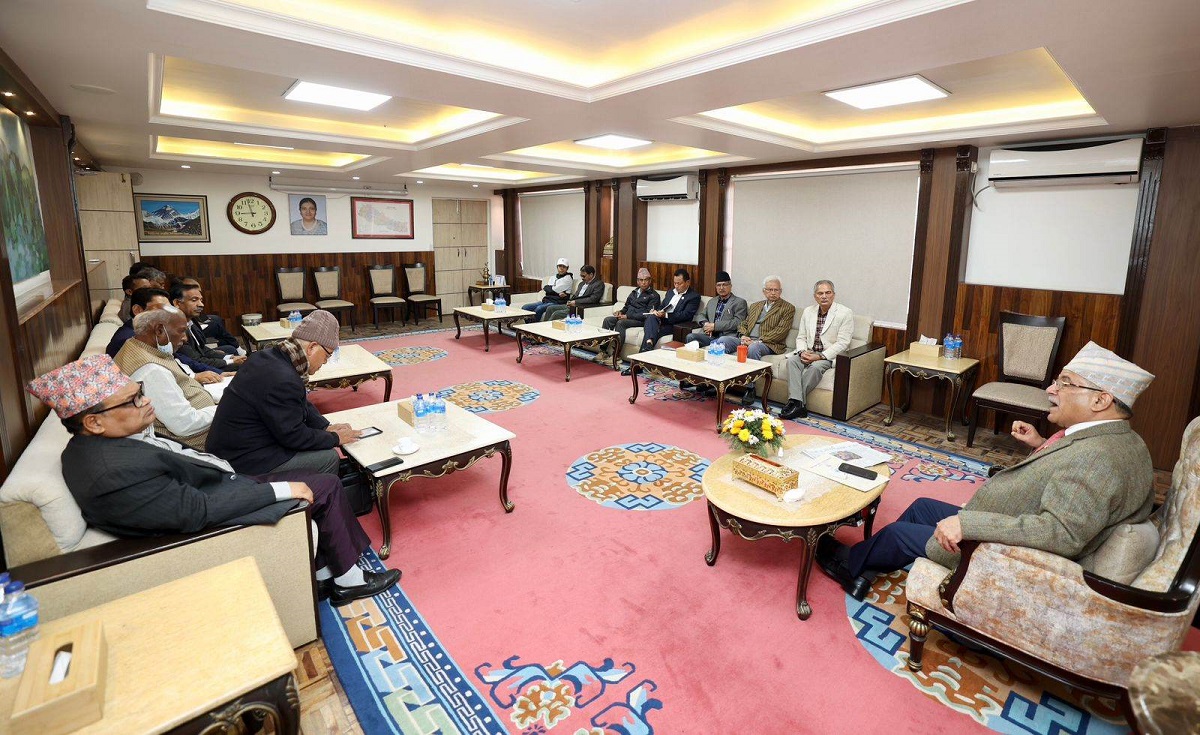Leaders from the Maoist stream have met at the prime minister’s (PM) residence in Baluwatar Tuesday morning in the aftermath of the Supreme Court (SC) ordering to register two writ petitions seeking arrest of CPN (Maoist Center) Chairman and PM Pushpa Kamal Dahal.
Baburam Bhattarai and Mahindra Raya Yadav from Nepal Samajwadi Party, CPN leader Khadga Bahadur Bishwakarma, CPN (Majority) leader Dharmendra Bastola, CPN (Revolutionary Maoist) leader CP Gajurel, Baigyanik Samajwadi Communist Party leader Bishwa Bhakta Dulal, Karnajit Budhathoki, Hemanta Prakash Oli and others participated in the meeting, according to PM Dahal’s secretariat.
Maoist Center Vice-chairman Krishna Bahadur Mahara, General Secretary Dev Gurung, and Maoist leaders including Matrika Yadav, Haribol Gajurel and Shakti Basnet among others also attended the meeting.
The leaders have been saying that the erstwhile Maoists should unify as far as possible or at least form a joint front in light of the SC order.
The SC reasoned that conflict-era cases cannot be stretched for eternity while ordering to register two writ petitions seeking arrest of CPN (Maoist Center) Chairman and Prime Minister (PM) Pushpa Kamal Dahal.
Justices Ishwar Khatiwada and Hari Phuyal while revoking the administration’s decision to not register the petitions brought by Kalyan Budhathoki of Ramechhap and advocate Gyanendra Aran have observed that the petitions were brought raising questions about rights to justice including reparations and compensation due to the citizens who were victims during the armed conflict.
“Criminal justice system should not remain inert, void or in an ineffective state. The issues of the victims getting to know the fact-based information, justice and reparations in the incidents of grave violations of human rights during the period of armed conflict as per the peace agreement, Nepal’s Constitution, this court’s orders, and international laws and principles do not seem appropriate to be kept stuck for eternity showing different reasons.”
The Apex Court ruled that the regular court should register cases demanding order to investigate conflict-era incidents as the bodies for transitional justice seem inactive.
The Truth and Reconciliation Commission (TRC) and the Commission of Investigation on Enforced Disappeared Persons have been formed to resolve conflict-era cases but they have yet to start work in earnest due to apathy of successive governments and political parties.
Addressing an event organized at Khula Manch in Kathmandu on the occasion of Maghi on January 15, 2020, Dahal had refuted allegations that he had killed 17,000 people during the decade-long Maoist armed conflict but said that he would take responsibility for the deaths of 5,000 of those killed during that period. He had also said that he would take responsibility for all the good and bad things that happened during the armed conflict.
In November 2022, the SC administration had decided not to register the two petitions seeking an order to arrest Dahal on the basis of his statement.
The court administration had refused to register the petitions stating that conflict-era cases are outside the jurisdiction of the SC as they would be addressed by the transitional justice mechanism.
The petitioners, Kalyan Budhathoki of Ramechhap and advocate Gyanendra Aran, had then filed an application against the decision.
Conducting a hearing on their application, a joint bench of Justices Ishwar Khatiwada and Hari Phuyal on Friday revoked the administration’s decision to not register the petitions.
Aran and Budhathoki have stated in their petitions that they are conflict victims and that they have also filed complaints against Dahal at the Truth and Reconciliation Commission.
They have sought maximum punishment for Dahal and others as per the law, stating that Dahal had made a public statement taking moral responsibility for killing 5,000 people. They have also sought an interim order to arrest Dahal and move the necessary investigation process forward.

